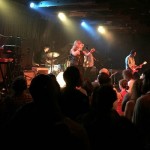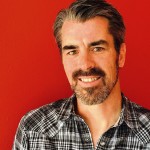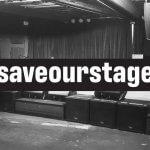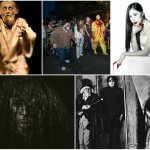By 9:44 on Sunday night, I’m still not convinced I like this band. In the days since previewing the show I’m now attending, I’ve given “Restless Ones” a good listen several times over, and tossed a cursory listen to a couple of earlier albums. I like the energy. I like the musical marksmanship. I like the twist on genre, mashing a dash of psychedelic into a base of Americana. But that voice hovering over the top of it all — the one every writer to mention Heartless Bastards comments on without fail — I’m not sure about that voice. It’s like coffee when you’re 15 and the taste hasn’t quite taken hold. It might. And you may one day be an addict. But that day is not today.
This is not helped by the fact that I’m coming off a half-hour set by opening act Slothrust, whose aloof, gritty, provocative angst and lyricism is forcing me to recall the time I stood pressed against a club stage in October of 1991 watching Kurt Cobain and friends rip through a live version of Nevermind, three weeks before the “Smells Like Teen Spirit” video blew up the world and took glam rock down forever. Full of surprising dips and frenzies and frantic tempo changes, Slothrust is an anti-hook, next-gen Nirvana, complete with a sloppy sense of note-shredding and awkward stage presence that seems only to make them somehow better.
They more than deserve a spot on the list of bands redefining and shaking up the post-post-punk world and making us all remember what rock music feels like at its grittiest. I’ll be listening to more of that in the coming days, for sure.
If I’m going to love Heartless Bastards after that display, they’re going to have to bring something strong.
The iPhone clock strikes 9:45 and Erika Wennerstrom follows her band of four on to the stage. She’s wearing a black leather vest, her long blond hair draped over the back, and an ankle-length black skirt. It’s the age-appropriate version of rock attire, curated and shined up — a universal sign of someone who’s been doing this long enough to stop trying to shock anyone and who now just wants to put on a good show. But then she slings a 22-pound Les Paul over her shoulders and plays it like the best of ‘em.
Musically, they’re the opposite of Slothrust. The Bastards are crisp, high-gloss, sharp — all those adjectives you assign to a set of pros who actually learned to play well before taking their self-expression on the road.
Together, the scene is a bit reminiscent of watching one of those aging rock bands who’ve put out 17 albums and are out on a career wind-down tour of the B-list songs. You know the type — they’re all stellar musicians, but you liked them better about six albums ago. They play at half the tempo they used to. They bounce on beat together, head-banging to the ghost of their own youth.
But the Bastards are only on album number five. They have the chops, but not the history. Which begs the question: what’s the trajectory?
Wennerstrom’s songwriting is strong and playfully genre-breaking, but at times, it feels as if she’s going out of her way to avoid writing a breakthrough hit. She and her crew have all the makings of a sellout rock band. Their talent shows through in excess. They play like they’ve been on the road nonstop since getting out of rehab — they’re tight, they’re having fun, and they’re at the top of their game. But Wennerstrom has never been anywhere near a top 10 list. And for the life of me, I can’t figure out why. Surely, she knows how to crunch out a melody that evolves into a genuine hook, but “I Want You To Want Me” just never comes out of the small blonde being singing at the front of this stage.
At 9:49, this is what I’m still thinking. At 9:50, I look around at the crowd. Turns out, I’m the only one out of step here.
The 40-year-olds are dad-dancing. The twenty-somethings are swaying and singing along. The women are slipping into that slow, arms-in-the-air, first-thing-in-the-morning, yoga-stretch dance. Collectively, they’re mesmerized. Immersed. Their energy ripples out and takes hold of one row of feet after another. Few are outrageous — mostly it’s a crowd of shoe-shufflers — but nearly everyone is in on the movement. They’re smiling. They’re drinking. This is a crowd in the right place on the right night.
Over the next 45 minutes, the set has the usual up and down moments innate to a rock gig — nothing shocking, but solid enough that it keeps the room at attention. Wennerstrom’s voice, here in the here and now, is stronger and better and more enjoyable than the recorded version, where compression often sucks the life out of things too bold for the medium. Soon, my shoes are shuffling, too. My knees bend once or twice. It’s becoming a thing.
It’s near the end when I really see what this band is capable of doing. Things go dark and moody and bluesy. The tempo slows. The lights deepen. The band puts the audience into a trance. This crescendoes over several minutes until it culminates into a musical peak, ends, and then launches straight into a set-ending crowd favorite. As the band heads out, the few hundred people filling the room are chanting, “One more song! One more song!”
When the five-piece reemerges from the green room, it’s to close the night with a haunting live rendition of Tristessa. It starts out full of brooding guitars and equally moody lights. It ends with Erika Wennerstrom alone on stage, silhouetted in a haze of blue and purple backlighting, her hands in the air, her arms slithering from side to side above her, unmanned guitars pulsing and droning out from every amp, and that voice — that full-throated, bold, thick voice — belting out the Kerouac-inspired song’s final words, and a crowd whose cheering does not end until she leaves the stage, the guitars fade, and the house music lifts up to leave only a memory of something anything but heartless.
Hooks be damned. Heartless Bastards have earned me.
Photos by Robert Hoekman, Jr.










